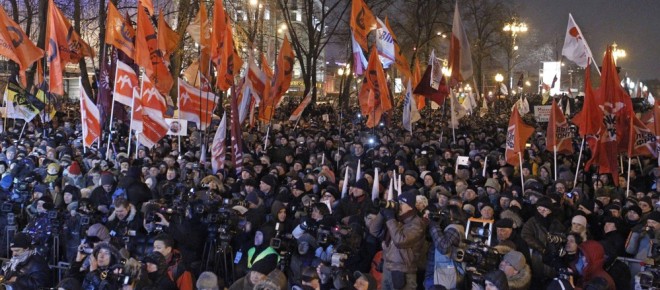The Russian spring
Around 550 anti-Putin protesters are arrested at rallies in Moscow and St. Petersburg
Russian opposition protesters gather at a rally in Moscow, Russia, Monday, March 5, 2012. Riot police on Monday broke up an opposition protest contesting Prime Minister Vladimir Putin’s victory in Russia’s presidential election, arresting dozens of participants, including prominent opposition leaders. The police action followed a rally in downtown Moscow that drew about 20,000 protesters angry over a campaign slanted in Putin’s favor and reports of widespread violations in Sunday’s ballot. (AP Photo/Mikhail Metzel)
Share
 It’s after midnight in Moscow. The anti-Putin rally at Pushkin Square has been broken up with — according to some reports — some 250 arrests, including opposition leader Alexey Navalny, whose accomplishments include popularizing the epithet “crooks and thieves” to describe Putin’s United Russia party. Another 300 were arrested in St. Petersburg.
It’s after midnight in Moscow. The anti-Putin rally at Pushkin Square has been broken up with — according to some reports — some 250 arrests, including opposition leader Alexey Navalny, whose accomplishments include popularizing the epithet “crooks and thieves” to describe Putin’s United Russia party. Another 300 were arrested in St. Petersburg.
I’ve got two notebooks and a digital recorder full of material which I’ll spend tomorrow trying to gather into some sort of coherent narrative for this week’s magazine. In the meantime, two thoughts:
1. This election absolutely was not legitimate. The ballot stuffing plays well on television and is easy to understand. It’s also important. But what I find more worrying is the extent to which the game is rigged before it even starts. Putin controls the political system. Candidates cannot register, political parties cannot form, without jumping through difficult hoops and getting approval from the electoral commission, run by a Putin lackey. He controls much of the media. Most significantly is the extent to which state resources are mobilized to endorse Putin. The past couple days have seen obscene displays of this: hundreds of buses ferrying in supporters from outside Moscow; victory rallies just outside the Kremlin; government departments organizing supporters. It’s a naked conflation of partisan politics and government. Hugo Chavez in Venezuela does the same thing.
2. Russians, many of them, won’t put up with this kind of crap anymore. A democratic Russian civil society is waking up. It’s members are energized, no longer cowed by authority, and are determined to change their country. It won’t be easy or fast, but they will.